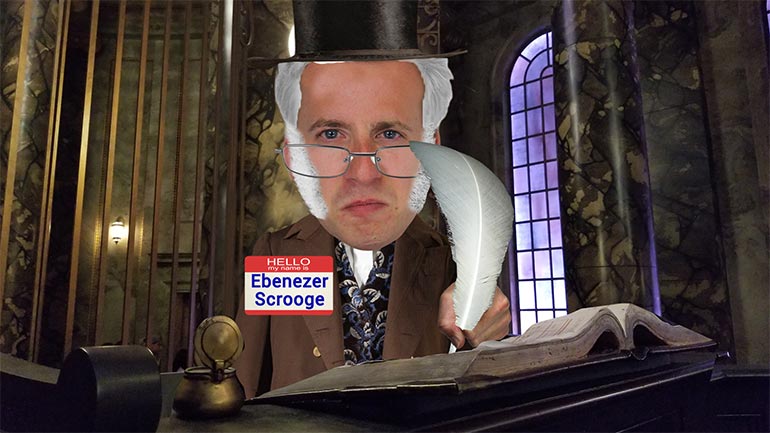ShmoopTube
Where Monty Python meets your 10th grade teacher.
Search Thousands of Shmoop Videos
Finance Definitions Videos 674 videos
What is the difference between federal and state taxes? Federal taxes: the whole country. Taxes for national defense, interstate roadways, national...
What is the difference between stocks and bonds? Stocks are ownership. They control the election of the board of directors, who hires the CEO, who...
What rights does a public stockholder have? Common shareholders elect the board of directors. They vote. They have the right to quarterly financial...
Finance: What is Equity? 44 Views
Share It!
Description:
What is equity? It's ownership. A stock, not a bond. A common shareholder, not a debt obligator. When you own one share in a million-share outstanding corporation, you own 1 millionth of that corporation. And usually, each share of equity gets a vote in electing the board of directors.
- Social Studies / Finance
- Life Skills / Personal Finance
- Finance / Personal Finance
- Courses / Finance Concepts
- Finance / Finance Definitions
- Life Skills / Finance Definitions
- Finance / Financial Responsibility
- College and Career / Personal Finance
- Subjects / Finance and Economics
- Finance and Economics / Terms and Concepts
- Terms and Concepts / Accounting
- Terms and Concepts / Banking
- Terms and Concepts / Board of Directors
- Terms and Concepts / Company Valuation
- Terms and Concepts / Ethics/Morals
- Terms and Concepts / Financial Theory
- Terms and Concepts / Investing
- Terms and Concepts / IPO
- Terms and Concepts / Marketing
- Terms and Concepts / Regulations
- Terms and Concepts / Trading
Transcript
- 00:03
Finance a la Shmoop what is equity well its ownership that's
- 00:08
what here's equity here's equity and here's [Vehicle with a paid sticker on the windscreen]
- 00:12
equity this is your equity in the pie your share of ownership your one
- 00:19
ten-millionth ownership of whatever dot-com which just went public example
- 00:24
you buy a home for 500 grand putting down a hundred thousand dollars and [Chalkboard with price of a home in front of a house]
Full Transcript
- 00:27
taking out a loan or mortgage of four hundred grand over the next eight years
- 00:32
you pay down that mortgage to be just three hundred grand and in the mean time [A payment chart graph]
- 00:36
the value of your house has grown to seven hundred grand
- 00:40
someone actually knocks on your door and offers to pay you that much in cash that [Man knocks on door and offers to pay for the house]
- 00:44
day all right what's your equity ownership in the house worth well you
- 00:49
have seven hundred grand as the price of the thing you own you have three hundred
- 00:52
grand in loans against it so if you sell you have to pay back the loans generally
- 00:57
speaking and you're left with four hundred grand as the value of the equity
- 01:01
you have in your home so let's spin things differently instead of the bank [A number wheel spinning]
- 01:06
loaning you debt money to buy your home the bank decides to partner with you as
- 01:11
[Bank shakes a womans hand] a co investing equity player well together you buy a condominium for 250
- 01:16
grand with you putting down 100k and the bank putting down 150 K both in equity
- 01:21
time passes tick tick tick and you sell the condo a decade later for $500,000 [Woman sells condo for $500,000 and hands over apartment]
- 01:28
okay now who gets what well now the bank was your equity partner instead of your
- 01:34
debt partner or lender so when you bought the condo you owned a hundred
- 01:39
divided by 250 of it or 40% and the bank owned a hundred fifty over 250 of it or [Woman doing math calculations on a chalkboard]
- 01:47
60% nothing changed your ownership stakes remained flat at forty sixty so now
- 01:53
at 500 K you sell and you keep 40 percent or two hundred thousand dollars
- 01:57
and the bank keeps sixty percent of five hundred K or three hundred grand and you [Woman and bank stand as dollar signs fall from the sky]
- 02:01
both doubled your money and note the power of debt or leverage in this model
- 02:07
had the bank loaned you the 150 K as debt instead of being your equity [Bank hands money to woman]
- 02:12
partner you would have probably paid off $50,000 or so of that loan in the ten
- 02:16
years you had it so you'd owe a remaining hundred
- 02:19
thousand dollars but you'd have sold it for the same five hundred grand and
- 02:23
after paying off the loan you'd have four hundred thousand dollars in your
- 02:26
pocket instead of two hundred thousands and yes there were interest payments
- 02:30
that went along the way as well as upkeep and risk and other things but in [Interest payments of 351,000 dollars on chalkboard]
- 02:34
theory you could have rented the home and hopefully you'd have broken even in
- 02:38
rational real estate rental market sorry we usually don't put that much math in [Lots of numbers on a pie as girl takes a slice]
- 02:42
our pie
Related Videos
GED Social Studies 1.1 Civics and Government
What is bankruptcy? Deadbeats who can't pay their bills declare bankruptcy. Either they borrowed too much money, or the business fell apart. They t...
What's a dividend? At will, the board of directors can pay a dividend on common stock. Usually, that payout is some percentage less than 100 of ear...
How are risk and reward related? Take more risk, expect more reward. A lottery ticket might be worth a billion dollars, but if the odds are one in...





































































































